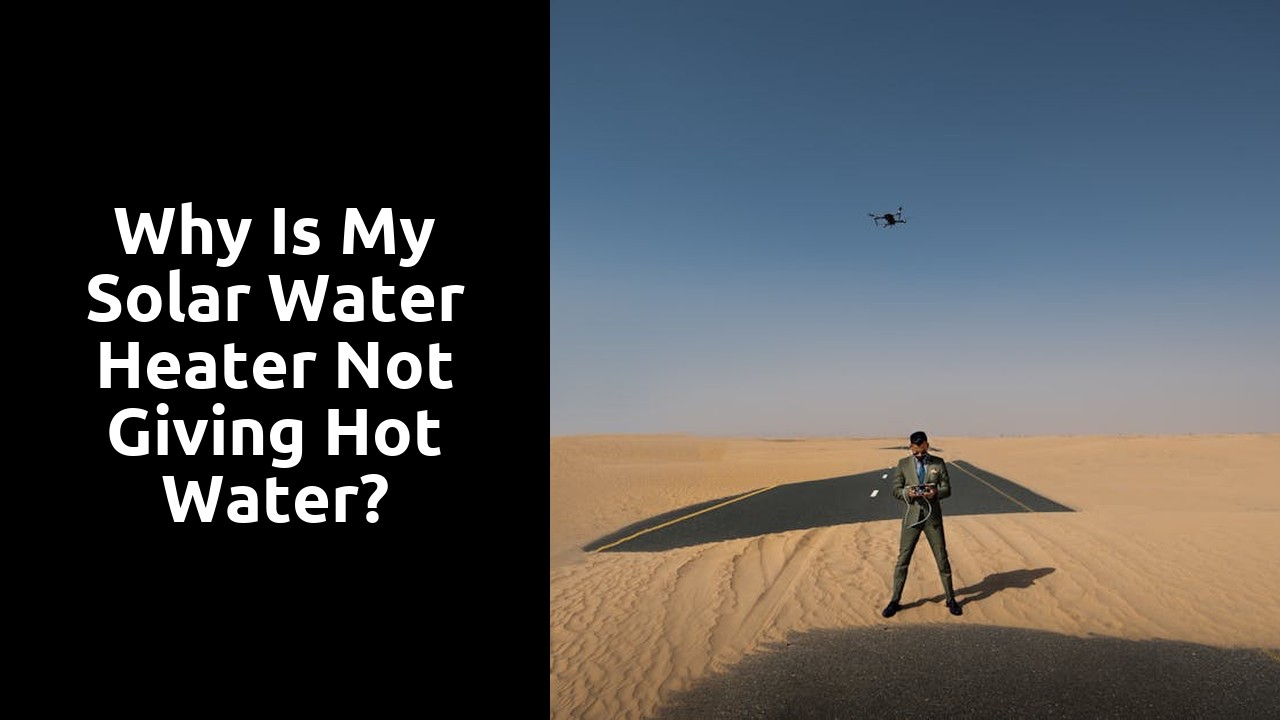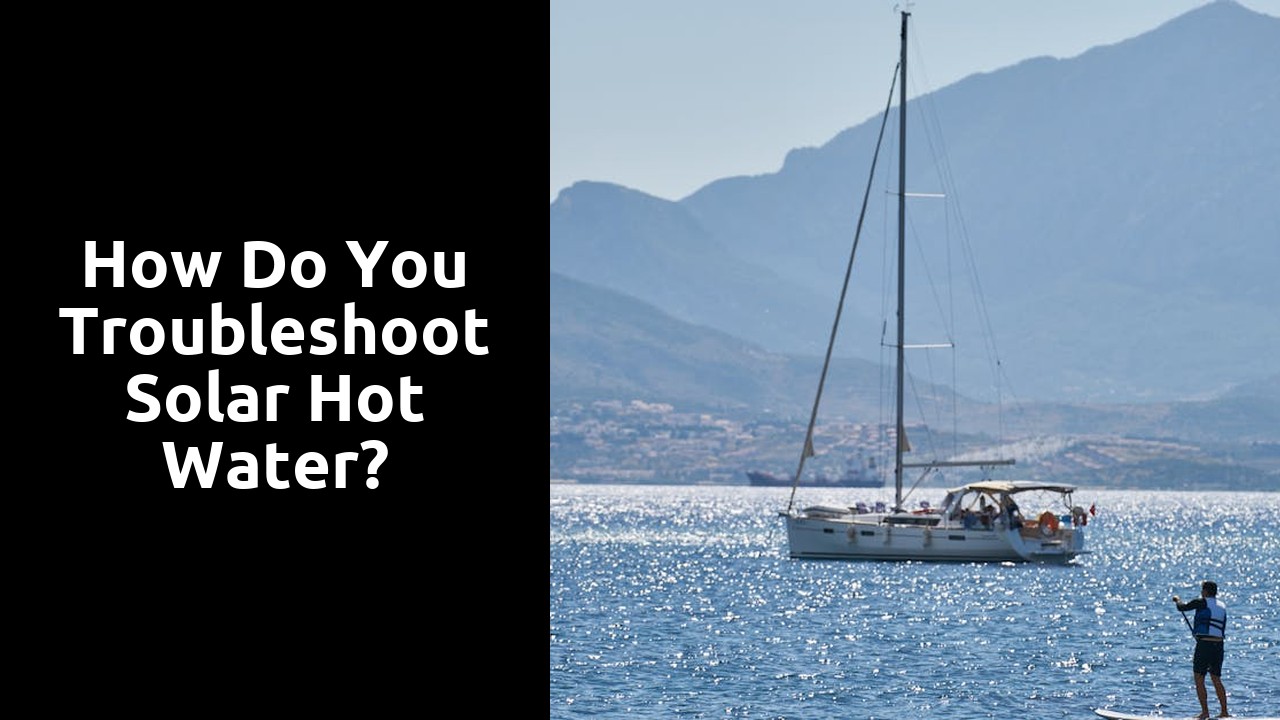
Table Of Contents
Preventive maintenance measures for optimal solar water heater performance
Solar Hot Water System Troubleshooting requires proactive maintenance to keep your solar water heater running efficiently. Regularly flushing the system to remove any accumulated debris is crucial to maintain optimal performance. Debris build-up can impede the flow of water through the system, leading to reduced hot water production. By ensuring that the system is free from obstructions, you can maximise its efficiency and prolong its lifespan.
In addition to flushing the system, it is essential to check for any shading from nearby trees or structures that may be obstructing sunlight from reaching the solar panels. Adequate exposure to sunlight is vital for the efficient operation of the solar water heater. By keeping the panels free from shading, you can ensure that the system can effectively harness solar energy to heat water. Regularly inspecting the surroundings of your solar water heater for any potential shading issues is a simple yet effective preventive measure to maintain optimal performance.
Regularly flushing the system to remove debris
Regularly flushing the system of your solar hot water system troubleshooting is a vital maintenance task that can prevent issues caused by debris accumulation. Over time, sediment and other particles can build up in the system, leading to blockages and reduced efficiency. By implementing a routine flushing schedule, you can help ensure that your solar water heater continues to operate at its optimum level, providing you with consistent hot water.
Failure to flush the system regularly may result in decreased performance and potentially costly repairs. Debris accumulation can impede the flow of water through the system, causing it to work harder and consume more energy to heat the water. By incorporating regular flushing into your maintenance routine, you can extend the lifespan of your solar hot water system and maximise its efficiency in delivering hot water to meet your household needs.
Environmental factors that can impact the efficiency of a solar water heater
Solar hot water systems can be significantly affected by environmental factors that may hinder their efficiency. One common issue is shading caused by nearby trees or structures. When the solar panels of the water heater are blocked from direct sunlight, they are unable to absorb and convert solar energy into heat effectively. This can lead to a decrease in the system's ability to generate hot water, resulting in lukewarm or cold water coming out of the taps instead.
Additionally, extreme weather conditions such as prolonged periods of overcast skies or inclement weather can impact the performance of a solar water heater. Cloudy days reduce the amount of sunlight reaching the panels, which in turn lowers the system's ability to heat water efficiently. It is crucial to consider these environmental factors when installing a solar hot water system to ensure optimal performance and to troubleshoot effectively if issues arise. Solar hot water system troubleshooting should include a thorough assessment of the surrounding environment to identify any potential factors that may be affecting the system's efficiency.
Shading from nearby trees or structures
Shading from nearby trees or structures can significantly impact the efficiency of your solar hot water system. When trees or buildings cast shadows on the solar panels, they can obstruct the sunlight needed to heat the water effectively. This obstruction reduces the system's ability to harness solar energy optimally, resulting in lower water temperatures. Solar hot water systems rely on direct sunlight to function efficiently, so it is crucial to ensure that there are no obstructions that could hinder the absorption of solar radiation.
To prevent shading from nearby trees or structures, consider trimming tree branches or adjusting the positioning of the solar panels. By ensuring that the solar panels receive maximum sunlight exposure throughout the day, you can enhance the performance of your solar hot water system. Regularly monitor the area surrounding your solar panels to identify any potential sources of shading and address them promptly. Properly managing shading issues is vital for maintaining the effectiveness of your system and ensuring a consistent supply of hot water. Solar Hot Water System Troubleshooting
Importance of proper installation in ensuring the functionality of a solar water heater
Proper installation plays a crucial role in ensuring the efficient functionality of a solar water heater. When the system is not installed correctly, it can lead to various issues such as leaks in the plumbing connections or inefficient heating of water. If the solar water heater is not installed in alignment with the manufacturer's guidelines, it can result in suboptimal performance and even render the system ineffective. Solar Hot Water System Troubleshooting becomes a challenging task when the installation is not carried out meticulously.
Moreover, incorrect installation can also impact the durability and longevity of the solar water heater. Compromised installation procedures may lead to wear and tear of components, reducing the overall lifespan of the system. Hence, it is imperative to enlist the services of professional installers who are well-versed in solar water heater installation procedures. By adhering to proper installation practices, homeowners can ensure that their solar water heaters function efficiently and provide consistent hot water supply. Solar Hot Water System Troubleshooting is greatly minimised when the system is installed correctly from the outset.
Checking for leaks in the plumbing connections
Checking for leaks in the plumbing connections is crucial for the optimal performance of your solar hot water system. Leaks in the connections can lead to a loss of heat transfer efficiency and ultimately result in your system not providing hot water as expected. Regularly inspecting the plumbing connections for any signs of leaks such as water drips, dampness, or corrosion is essential in maintaining the functionality of your solar water heater.
If you notice any leaks in the plumbing connections of your solar hot water system, it is important to address them promptly. Ignoring leaks can not only affect the performance of your system but also lead to water wastage and potential damage to other components. By promptly repairing any leaks in the plumbing connections, you can ensure that your solar water heater operates efficiently and continues to provide you with hot water when needed.
FAQS
Why is my solar water heater not giving hot water?
There could be several reasons for your solar water heater not providing hot water. It could be due to a lack of sunlight exposure, issues with the system components, or improper installation.
How can I prevent my solar water heater from underperforming?
To ensure optimal performance of your solar water heater, regular preventive maintenance measures should be taken. This includes flushing the system to remove debris, checking for leaks, and ensuring proper installation.
What environmental factors can impact the efficiency of a solar water heater?
Environmental factors such as shading from nearby trees or structures can significantly reduce the efficiency of a solar water heater by limiting the amount of sunlight it receives.
Why is proper installation important for the functionality of a solar water heater?
Proper installation is crucial for the functionality of a solar water heater as it ensures that all components are correctly set up, plumbing connections are secure, and there are no issues that could hinder its performance.
How can I troubleshoot my solar water heater if it is not providing hot water?
If your solar water heater is not giving hot water, you can start by checking for any visible leaks in the plumbing connections, ensuring that the system is receiving adequate sunlight, and confirming that all components are working properly. If the issue persists, it is recommended to contact a professional for further assistance.
